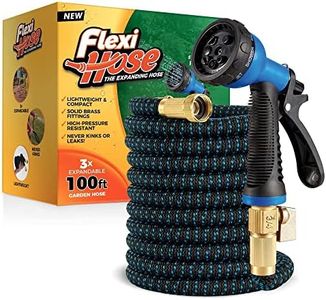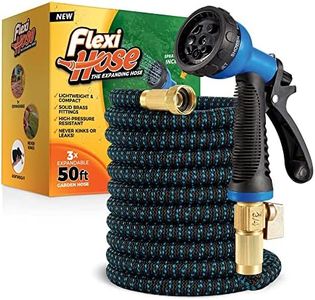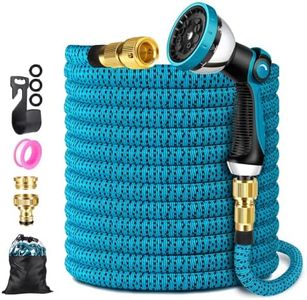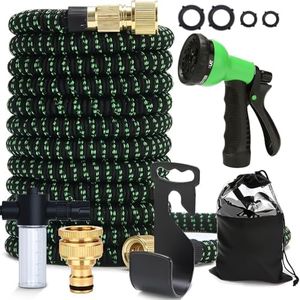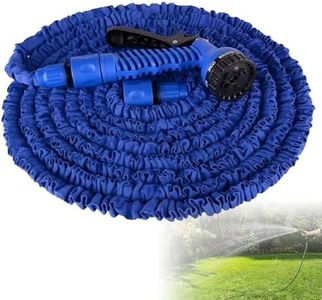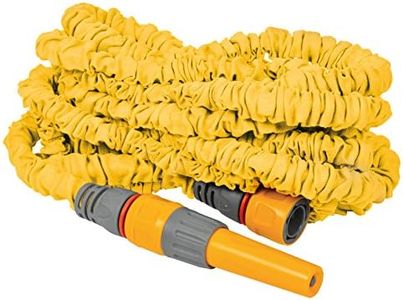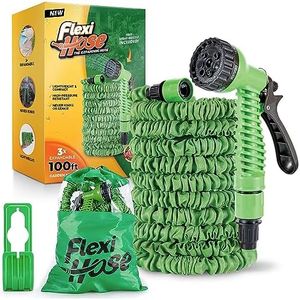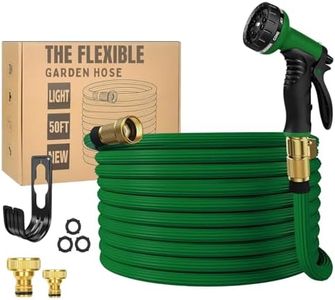We Use CookiesWe use cookies to enhance the security, performance,
functionality and for analytical and promotional activities. By continuing to browse this site you
are agreeing to our privacy policy
10 Best Expandable Garden Hoses
From leading brands and best sellers available on the web.By clicking on a link to a third party's website, log data is shared with that third party.
Buying Guide for the Best Expandable Garden Hoses
When selecting an expandable garden hose, it's important to think about how you'll use it in your yard or garden. Expandable hoses are designed to be lightweight, easy to store, and less prone to kinking, making them a popular choice for many homeowners. To find the best fit for your needs, you should pay close attention to several key features that affect their performance, usability, and durability.Length When ExpandedThis specifies how long the hose becomes when it's fully expanded with water. It's important because it determines how far you can reach from your water source, impacting your ability to water different parts of your yard or wash your car. Expandable hoses usually come in varying lengths, commonly 25, 50, 75, or 100 feet. Shorter hoses are more compact and easier to store, perfect for small areas or patios. Longer hoses give you more reach, but can be a bit heavier when filled. To choose the right length, measure the distance from your spigot to the farthest point you want to reach, adding a bit more for flexibility.
Hose MaterialExpandable hoses are typically made from layered latex or TPC (thermoplastic copolyester) with a fabric outer covering. The material impacts durability and resistance to leaks or bursts. Hoses with multiple layered latex cores are generally more durable and better at withstanding water pressure changes, while high-quality outer fabric helps protect the core from thorns and sharp edges. Thicker, stronger material is better for heavy, frequent use and rough surfaces, whereas lighter hoses are fine for gentle, occasional watering.
Fittings and ConnectorsThis refers to the parts that attach the hose to your tap or nozzle. Fittings are typically made from either plastic or metal (commonly brass). Metal fittings, especially brass, are stronger, more leak-resistant, and longer-lasting than plastic, making them ideal for regular or heavy-duty use. Plastic fittings are lighter and often cheaper, but can break or wear out faster. For frequent use or if you hate dealing with leaks, look for solid brass or other metal connectors.
Water Pressure RatingThe water pressure rating indicates the level of pressure the hose can safely handle without leaking or bursting. This is important because different areas and water systems deliver water at different pressures. Hoses rated for higher pressure are more robust and can handle the demands of high-pressure taps or hoses used with sprinklers or pressure washers. If you know you have high water pressure or plan to use spray nozzles with strong settings, pick a hose with a higher maximum pressure.
Weight and StorageWeight and storage refer to how heavy and bulky the hose is when empty and how easy it is to store. Expandable hoses are designed to be much lighter than traditional rubber hoses, making them easier to carry and move around the garden. When not in use, they contract to a much smaller size, so they're easy to store in small spaces. If you have limited storage or struggle with carrying heavy items, a lighter hose that contracts very small will be most convenient for you.
Kink and Tangle ResistanceThis feature is all about how well the hose resists twisting and kinking, which can block water flow and be frustrating. Expandable hoses are generally good at not kinking because their material and construction allow them to stretch and coil smoothly. However, some hoses are better than others at maintaining flow without kinks, especially as they age. If you want hassle-free watering, look for hoses with strong reviews about tangle and kink resistance and avoid extremely cheap models that may not perform well over time.
